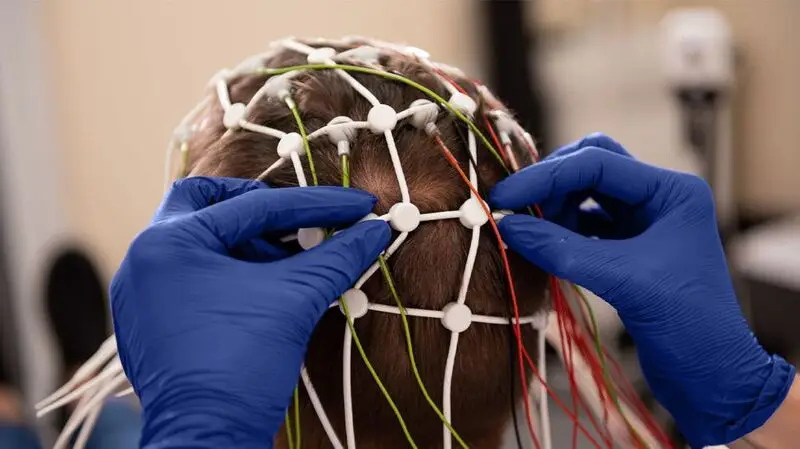
- A new study in mice suggests the hypothesis that brain-cleansing occurs during sleep may be inaccurate.
- The findings show that mice cleaned more toxins and metabolites from their brains when they were awake than when they were asleep or anesthetized.
- A long-term lack of sufficient sleep is linked to dementia and Alzheimer’s, but this new research suggests this is not due to brain clearing during sleep.
All mammals sleep, yet we are note entirely sure what benefits it provides.
Numerous theories exist, including processing the previous day’s memories. One idea that has gained wide acceptance is that during sleep, the body clears the brain of toxins and metabolite detritus.
A new study in mice finds that awake time cleans the brain more than when asleep or under anesthesia.
The study observed that 30% less fluorescent dye — standing in for toxins and metabolites — was cleared from the mice’s brains during sleep compared to when they were awake. When the mice were anesthetized, 50% less of the dye was cleared.
The researchers observed the rate at which the dye moved from the brain’s ventricles to other brain regions, making it possible to measure the degree to which the dye eventually passed out of the brain.
It is clear that humans often experience problems related to a lack of adequate sleep, ranging from a lack of mental sharpness and hand-to-eye coordination to serious Health issues. However, the results of this study suggest that a lack of brain cleansing due to insufficient sleep is not the reason for these effects.
The study is published in
The study’s senior investigator, Nicholas Franks, a professor in the Faculty of Natural Sciences at Imperial College London, explained to Medical News Today, “Our working hypothesis is that there is a core reason why we and other mammals sleep.”
For instance, our vulnerable position during sleep might suggest that sleep is important for survival.
“If so, then the most plausible mechanisms are those that provide a crucial benefit — some sort of basic housekeeping — that cannot occur, or occurs very inefficiently, during waking. This was one strength of the clearance idea,” Franks said.
Franks noted another hypothesis: sleep allows the consolidation of memory.
In this form of brain-clearing, “some housekeeping of neuronal connections (synapses) formed during waking is carried out during sleep, perhaps removing unwanted synapses, and/or strengthening ones that are to be retained,” Franks said.
Jonathan Cedernaes, PhD, a researcher in the Department of Medical Sciences at Uppsala Universitet, told MNT the study’s findings that sleeping and being under anesthesia produced similar reductions in brain clearance are credible. Cedernaes, who focuses on transplantation and regenerative medicine, was not involved in the study.
However, he expressed several concerns regarding the study that undermine definitive conclusions.
“This is in mice, so we do not know how it translates to humans,” Cedernaes said.
He proposed awaiting follow-up studies and confirmation before discarding the idea that sleep is a time for brain-clearing.
He also noted that the study’s authors chose to use a small-molecule dye and that a larger-molecule dye might have produced a different brain-clearing result.
Another possible issue, Cedernaes said, is that in this study, researchers deprived mice of sleep to study wakefulness before letting them sleep.
“It would be important to also see what happens during natural (non-sleep deprived) sleep, and across a full normal 24-hour sleep-wake cycle,” he pointed out.
Circadian effects — [biological processes that are driven by the body’s internal clock] — may conceivably play a role in brain clearance, Cedernaes said.
“
“Here, we also do not know what happens when mice are sleep-deprived for a longer time period, say chronically, when they are under a greater homeostatic sleep pressure and under stress from insufficient sleep.”
Cedernaes said that, in research, “comparing sleep loss with normal sleep is often used as an approach to establish what sleep normally does” and to “also rule out circadian effects.”
Cedernaes explained that the new study does not refute “the fact that levels of proteins linked to neurodegeneration, such as tau, are produced at higher levels during wakefulness when neuronal activity is high.”
He noted that in
In human
There is a body of research suggesting “too little sleep, and poor sleep, are associated with a higher risk of neurodegeneration and specifically Alzheimer’s disease,” Cedernaes said, citing 40-year follow-up data from his own research supporting this connection.
“So even though sleep may not facilitate clearance of metabolites from the brain, there are other mechanisms through which sleep has restorative properties that contribute to healthy aging of the brain,” Cedernaes added.
Frank noted, “Our study simply removes one explanation of how there might be a connection between poor, or short, sleep and neurological disorders.”
“Our data only show that the waking state gives improved clearance compared to being asleep or anesthetized, but we do not know what aspects of the waking state are responsible,” Frank said.
“It might be just neuronal activity. We can speculate that exercise would improve clearance further, but this has yet to be shown.”
Indeed, preliminary research suggests that physical activity may help clear metabolites from the brain, but further studies are warranted.
Cedernaes acknowledged while this remains a new area of study, sleep is often associated with better health outcomes.
“We know that a healthy lifestyle, meaning sufficient high quality sleep, a healthy diet, and sufficient amounts of
physical activity , are allassociated with a lower risk of developing neurodegenerative disease later in life.”— Jonathan Cedernaes, PhD, researcher





